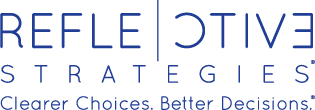This is an important focus of my work at Reflective Strategies®, which aims to help leaders see their choices more clearly and make decisions more confidently.
Big decisions get most of our attention—deciding to get married, to take a new job, or to move to a new city. As in our private lives, so in our public ones. Leaders focus most on their big ticket moves—whether to buy a competitor, launch a new product, or enter a new market.
Big decisions feel important, pump up our egos, and make us feel like we’re alive, relevant, and not constrained by the increasing complexity surrounding us. We’re rewarded for bold moves. Sometimes we even create circumstances (however unconsciously) that force bigger decisions than are actually required just for the rush of the moment, which propels us on to the next dramatic move, and more accolades. This drama can be addictive and everything can become a big decision.
But by any reckoning, recognizably big choices represent no more than a very small percentage of the innumerable decisions leaders make throughout their careers. Life is lived—and leadership defined—through the small, daily, but collectively consequential choices we make—whether to meet with a colleague who wants some help; pick up the phone to seek a valued mentor’s input; give an early alert to a trustee who cares deeply about a particular issue coming before the board; or spend time with front line staff hearing the voice of the customer.
As important as what we decide to do is how we decide to do it—the mindset that informs the choice. Our presence—the personal and situational awareness with true acceptance of circumstance— we bring to our daily decisions makes all the difference.
This awareness flows from the answers to two questions: Do we really know why we’re making the decision, beyond any superficial motivations? And do we know how this mindset informs our actions? These are predicates to the mindful management mentality I work with leaders to cultivate.
It’s important to ask and answer these questions, at least privately, because the “right” decisions—those that create personal or organizational value–come only from the right motivations. This truth may not be immediately apparent but will soon become evident.
- Are you promoting the colleague (or not) based on his merits or because of political or some other pressure that, when it resolves, will leave the person in a role to which he is unsuited?
- Are you calling your mentor to complain about something done to you or to gain insight into what you can do for yourself to better accept and, possible, change your circumstances?
- Is disturbing a trustee’s day warranted because you’re genuinely seeking input to shape a better recommendation to the board or are you just covering your tail? (She’ll know the difference.)
- When you don a headset in your call center and listen in on customer queries and complaints are you present enough to experience the reality of how customers relate to your product or are you too distracted because you’re mentally refuting what they’re saying?
We can all think of situations, even trivial ones, where a decision didn’t result in the outcome we’d anticipated. The Starbucks fix that’s going to make your morning winds up in your lap because you didn’t allow enough time and wound up in stop and go traffic. And if we’re honest, this happens much of the time because we can’t possibly anticipate all the downstream complexities of the changes we initiate, let alone control them.
But if we do the hard, post mortem work of figuring out why things happened the way they did, we’ll likely find that
- We hadn’t thought fully enough about the context in which we were making the decision
- We’d been short-sighted, trading short-term gain for long-term pain by discounting the latter
- We’d overestimated our insight into those affected by the decision or been too egoic to bother to even find out what mattered to them
- We’d let our mental projections and shifting emotions guide our choices in the moment.
In other words, we weren’t as present as we should have been in making and executing the decision.
But even if we find presence sometimes hard to cultivate, we know it when we see it.
We recognize the people who are present in our lives; we might even refer to them as having great personal presence, an encomium that is tellingly less used than it once was. We often can’t put a finger on what it is that they do or say that makes them special, but we know it’s there.
Yet it’s not rocket science. In Part 2, I’ll talk about the qualities of presence and how its opposite, absence, explains why so many of us find our professional lives less rewarding than we’d wish and what we can do about it.


